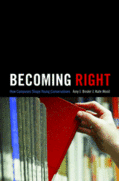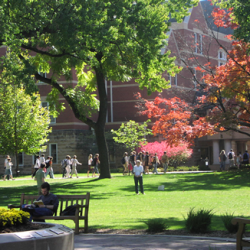Peter Sacks is an author, economist, essayist and social critic.

Three-year bachelor’s degrees are back in the news mostly because colleges and universities are coming under heavy pressure to make higher education more affordable. Last month New York University, one of the most expensive schools, launched its “NYU Accelerate,” which officials called “a new program that outlines pathways to make it easier for some students to […]
Read More
“It just isn’t the case that university economics departments are heavily stacked with libertarians and free market advocates. By roughly two to one, economics profs are of the interventionist persuasion, ranging from Keynesians to Marxists.” – George Leef. Conservative critics of academia will tell you that socialism and Marxism are pervasive in such fields as […]
Read More
According to many critics, the case is shut. Higher education — the one American institution that should make intellectual diversity a first priority — actually appears to do just the opposite. In fact, some critics suggest that universities have made it a top priority to create an environment of intellectual homogeneity – to an extent […]
Read More
The conventional meritocratic recipe for success is simple enough: study hard in school, get good grades, be involved in one’s community, find an appropriate college, apply for jobs in your field of study, and everything else falls in place. But that’s not how it really works says Lauren A. Rivera, author of Pedigree: How Elite Students […]
Read More
In her new book, Harvard Law Professor Lani Guinier attacks “testocracy,” the over-reliance on standardized tests in deciding who gets into college, who has the chance to attend America’s premier institutions, and who is relegated to the cheap seats of community colleges and for-profit schooling. Unfortunately, Guinier’s “Tyranny of the Meritocracy: Democratizing Higher Education in […]
Read More
As a former journalist who joined academe, I was often struck by the obscurity of administration-faculty communication. Murkiness prevailed, along with the absence of clear subjects and verbs, and worse: the absence of clear meaning and intention. “Say what you mean and mean what you say” was more like “say it sort of like you […]
Read More
American higher education has seriously misguided priorities. Across the country, schools are lowering their academic standards while increasing amenities. Indeed, given the proliferation of luxurious dorms, world-class student exercise facilities, and gourmet dining halls, one might say that American colleges and universities emphasize recreation over education. Unsurprisingly, students are losing out. In their new book, […]
Read More
Hardly a day goes by that policymakers, educational leaders and corporate executives don’t lament the “STEM crisis,” the alleged shortage of American workers trained in science, technology, engineering and math. These warnings come so often that the “crisis” is now perceived as an uncontested fact. Tapping America’s Potential (TAP), for instance, a group of some […]
Read More
In his new book, Philology: The Forgotten Origins of the Modern Humanities, James Turner has written a rich intellectual history of what many American scholars would describe as the long lost art and science of philology. A rebirth of philology is also long overdue, says Turner, who is the Cavanaugh Professor of Humanities at the University of Notre […]
Read More
Is majoring in the liberal arts a bad economic decision? Debra Humphreys and Patrick Kelly don’t think so. In their recent study for the Association for American College and Universities (AACU), they show that liberal arts majors enjoy comparable long-term career prospects as students who obtain degrees in more “useful” fields. Students who study the […]
Read More
The ongoing hype over MOOCs (Massive Open Online Courses) parallels the cold fusion debacle of 1989. The technology sounded like a panacea, a cheap and endless source of energy. Then it flopped. Another great notion down the drain. Similarly, educational entrepreneurs once believed that massive online courses would revolutionize higher education. MOOC providers, partnering with […]
Read More
Americans expect the impossible of their higher education system. We demand that it serve dozens of different constituencies; the political and public agendas of left and right; national economic imperatives; and contribute to the world’s scientific progress. Moreover, we require that the system perform these tasks equitably, maximizing the welfare of well-off and poor alike. […]
Read More
Sophisticated consumers of higher education always understood that unless they were very wealthy they would rarely have to pay the full sticker price of college. By contrast, information-poor students, often from lower income families, were often unaware that a college’s stated price was not really the price. Believing that high-priced schools were clearly unaffordable, many high-achieving […]
Read More
The higher-education story of the week is about cost: colleges and universities are cutting prices. At least that’s the impression one gets from media coverage of the annual report from the National Association of College and University Business Officers (NACUBO). “Colleges Cut Prices by Providing More Financial Aid,” states the Wall Street Journal. “Private U.S. […]
Read More
In my 1996 book Generation X Goes to College, I predicted that virtually anyone with a computer and a modem would have access to the storehouse of human knowledge. As a result, higher education as we know would become an anachronism, if not obsolete. The university’s status would diminish because it would lose its competitive […]
Read More
The end of higher education as we know it is no myth. Say you have three children and they’ll come of college age about two years apart. That’s a lot of money. But what if the college were to make you a deal? Buy one college education at full price, get the next college education […]
Read More
Some critics have called for a near-total rollback of the government’s involvement with higher education, including the end of subsidies to low-income students. Last month, for instance, Jarrett Skorup of Michigan Capitol Confidential.com suggested that state and federal governments should quit subsidizing higher education altogether because the aid fails to improve individual economic prospects or […]
Read More
Twenty three billion more. That’s what it would cost taxpayers over the next 10 years to restore the federal Pell Grant to its purchasing power 40 years ago. The early 1970’s were the heyday of the Pell Grant, the federal program targeted to low-income students. But now the maximum Pell Grant of $5,500 is […]
Read More
Richard Vedder made the breathtaking assertion here yesterday that “public support of American higher education, on balance, has increased income inequality in the United States.” He claims we must “drastically” reduce government subsidies for education in order to attack income inequality. He calls his view “non-orthodox.” I would just call it wrong. Vedder states, for […]
Read More
As a staffer with the U.S. Chamber of Commerce in the early 1970’s, would-be Supreme Court Justice Lewis F. Powell Jr. penned his historic, if awkwardly titled, memo, “Attack on American Free Enterprise System.” In that August 1971 “confidential memorandum,” to the Chamber’s board of directors, Powell called for an unprecedented effort on behalf of […]
Read More
The naysayers started their nitpicking the day after President Obama, in his State of the Union Speech, presented his plan to kick-start America’s sputtering system of higher education. George Leef of the Pope Center said “Obama’s talk about getting tough with colleges over tuition is pure political blather.” Hans Bader and others offer another off-center […]
Read More
When individuals seek higher education, why should all of us have to pay? After all, individuals decide whether to seek a college degree based on their own calculations of expected costs and benefits. That taxpayers must bear the burden of financial aid to these individuals seems unfair. Given the billions of dollars governments pay individuals […]
Read More
If college and university officials finally want to solve the longstanding problems ofmediocre retention rates and pitiful graduation rates, then a magic, off-the-shelf solution awaits them. It’s called MyEdu, a private company that claims its website will help colleges solve the problem of disappearing students. How? By allowing students to see such titillating facts as […]
Read More
Megan McArdle of the Atlantic, with a few strokes of her blog pen, has just solved the problem of too much student debt and the college affordability dilemma — all while ensuring access to higher education for those who truly deserve it. That is, for folks like herself. First, bowing to the widely circulated claim […]
Read More
In a recent essay in The Atlantic, Andrew Hacker and Claudia Dreifus lament that most students have to take out college loans. They write: “At colleges lacking rich endowments, budgeting is based on turning a generation of young people into debtors.” While Hacker and Dreifus blame the universities for encouraging students to take on more […]
Read More
Are for-profit colleges and universities getting a raw deal from the government compared to their more elitist peers in the private non-profit sector of American higher education? Vance H. Fried, writing in a recent policy analysis brief published by the libertarian think-tank, the Cato Foundation, argues just that. Fried is a former private-practice attorney, oil […]
Read More
Tuition pricing for college is a strange business, combining a big sticker price (which few people actually pay) with big discounts in the form of institutional grants (which most people should know enough to negotiate). College pricing is even stranger than the car business. Automobile dealerships aren’t likely to give one customer a sales discount […]
Read More
A growing chorus of critics says a college education is finished as the ticket to economic success and a middle-class life. The economy of the future, these critics suggest, actually requires far fewer college-educated citizens, because the U.S. economy is generating tens of thousands of jobs that require little or no higher education. In essence, the […]
Read More
As the author of a college guide that tries to help college-going students identify schools that would be a good “match” for them as individuals, I’ve always had three main gripes with the U.S. News & World Report rankings. First, you can’t quantify the really important factors that go into selecting the right college, such […]
Read More
When Minding the Campus asked me if I would write something about two Canadian engineering professors walking out of class to protest rude and disruptive students in their classrooms, I happily obliged. What harm, I told myself, could there be, after so many years of avoidance, to re-visit this issue? After all, it has been […]
Read More